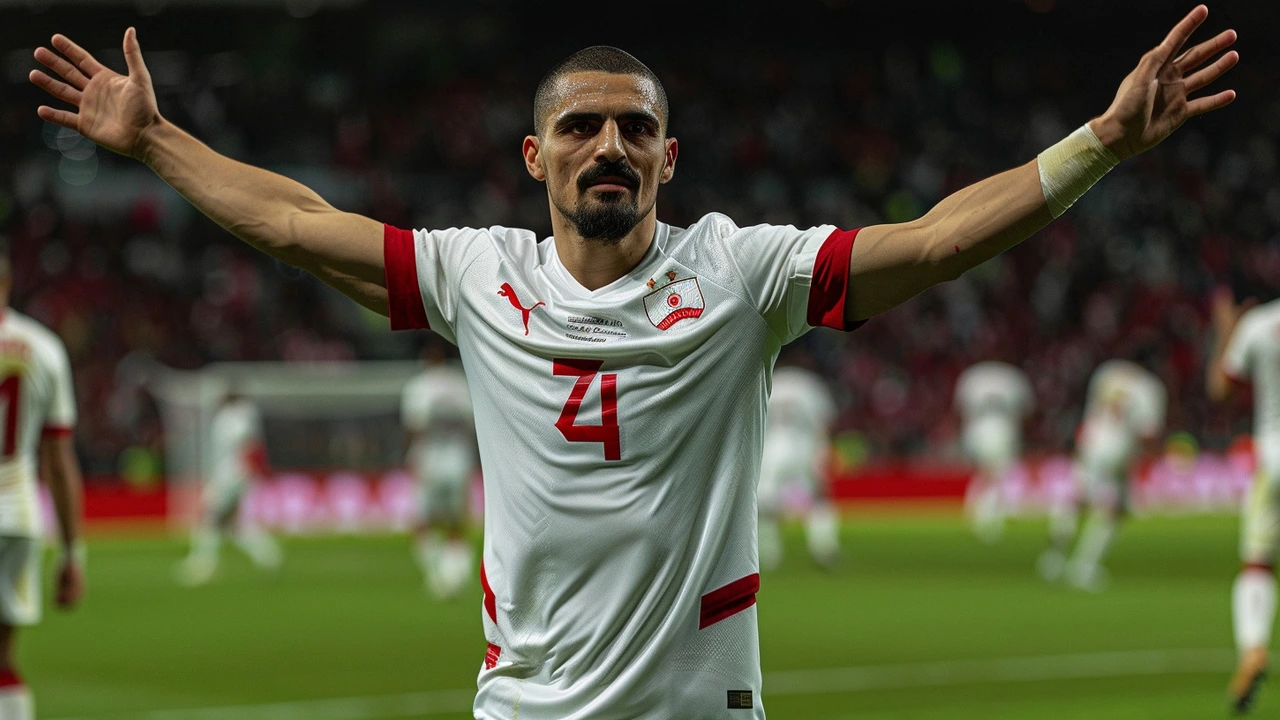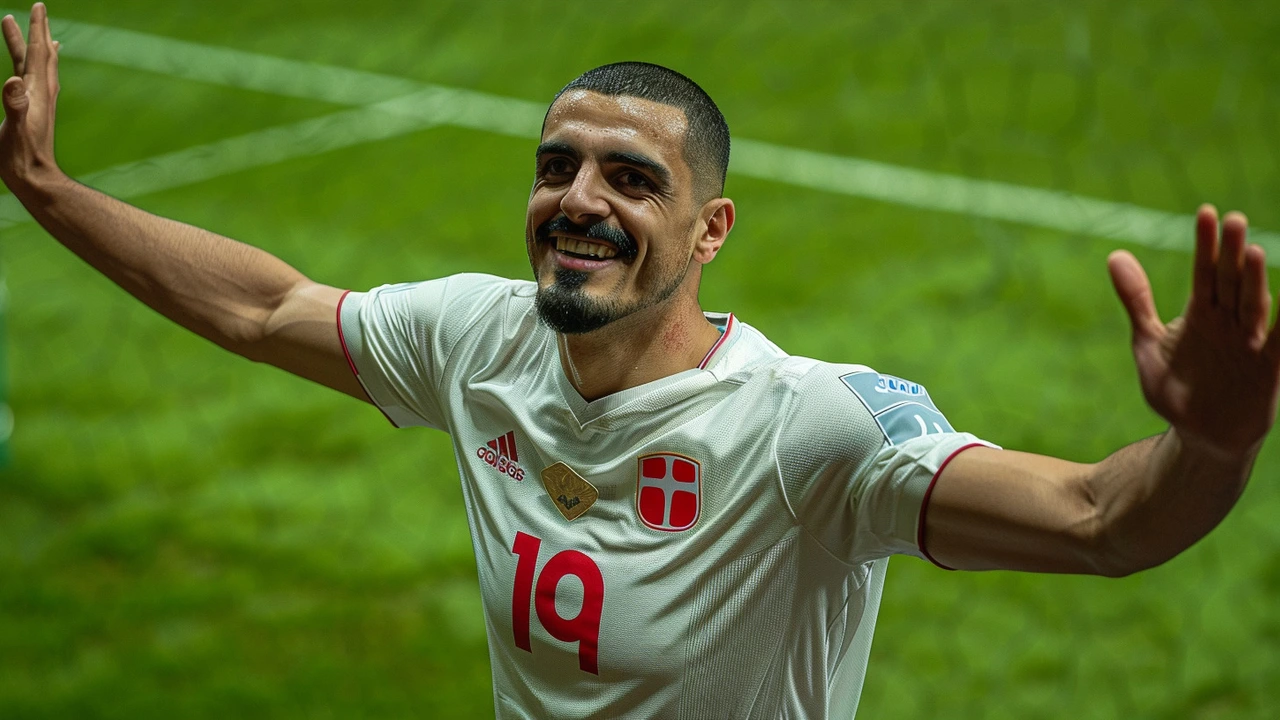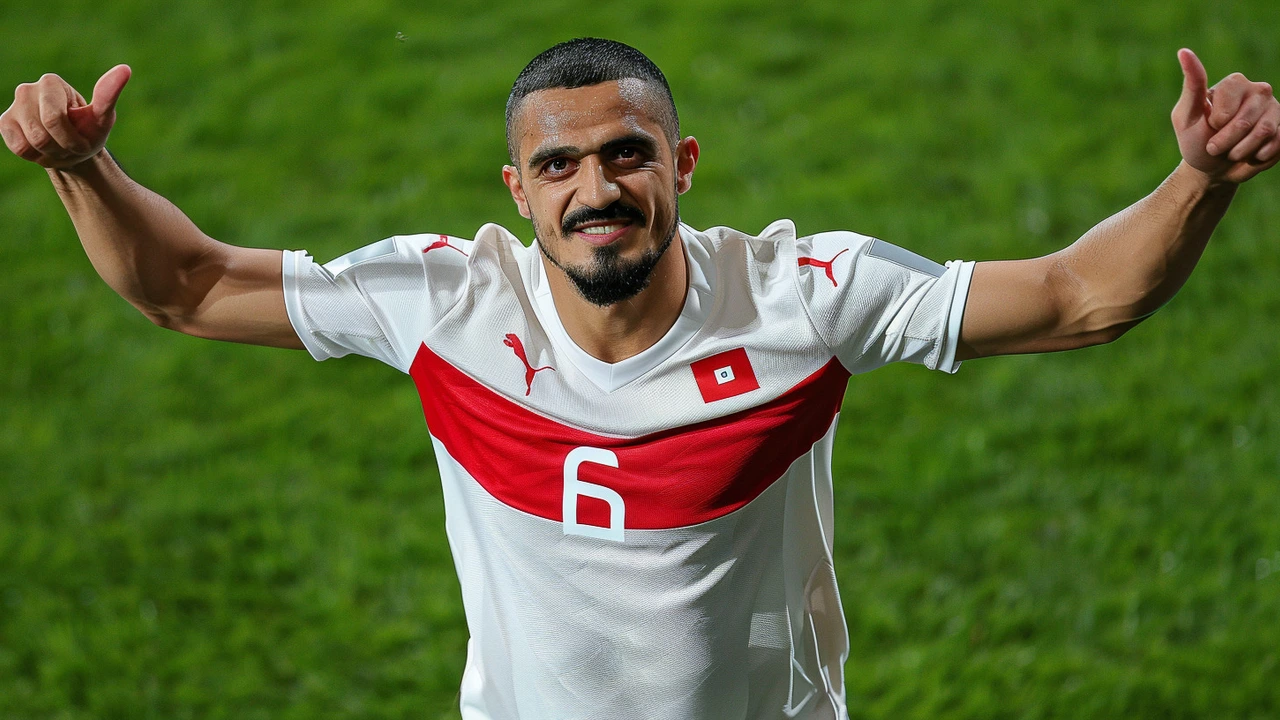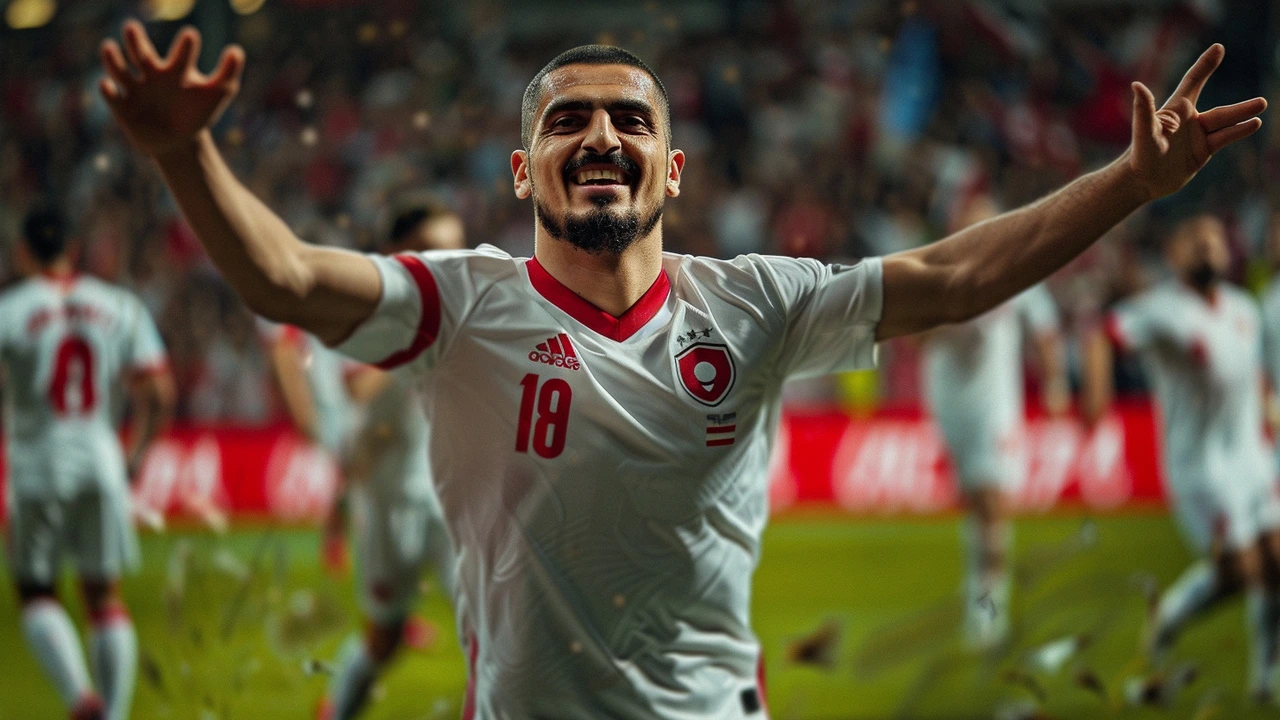UEFA's Investigation into Merih Demiral
UEFA has started a probe into Turkish footballer Merih Demiral after his goal celebration in the Euro 2024 match against Austria. The investigation centers on a hand gesture Demiral made, which is associated with the extremist nationalist group Ulku Ocaklari, also known as the Gray Wolves. This gesture, now banned in countries like France and Austria, has the football community and political spheres worried about its potential to incite politically motivated violence.
Controversial Gesture's Implications
The celebrations followed Demiral's two goals that were instrumental in securing Turkey's advancement to the quarterfinals. However, the nature of his celebration overshadowed what should have been a moment of sporting triumph. The gesture has not only sparked a UEFA investigation but has also reignited debates about the intersection of politics and sports.
Ulku Ocaklari, the nationalist group connected to Demiral's gesture, is known for its hardline stance and has been implicated in numerous instances of political extremism. Nations impacted by the group's activities had no choice but to ban the symbol, fearing its potential to incite violence. In recent years, sports has seen its fair share of politically charged gestures, but the increasing frequency of such incidents raises important questions about the role sports organizations need to play in addressing these concerns.

Setting a Precedent: Past Incidents
Unfortunately, this is not the first time Merih Demiral has been in the spotlight for controversial actions. Back in 2019, he, along with 15 other Turkish players, drew significant criticism for mimicking military salutes during matches. This occurred amid Turkey’s military operations in Syria, and the incident was interpreted as showing support for the national military actions at a time when tensions were already high.
These previous incidents provide context for the current investigation, as they suggest a pattern in Demiral's behavior when it comes to politically charged gestures. The footballer's actions have repeatedly brought politics into the realm of sports, sparking debates and necessitating regulatory responses from sports governing bodies like UEFA.
UEFA's Role and Responsibilities
This latest investigation serves as a vivid reminder that UEFA, and sports organizations in general, have a crucial role in upholding the sanctity of sports as a unifying force. They must ensure that the platform is not used to propagate political ideologies that could potentially incite violence or create divisions among fans and players. UEFA's zero-tolerance stance on such gestures is a step in the right direction, yet it underscores the larger challenge of keeping sports arenas free from political interference.
The timeline and outcome of this investigation remain unknown as of now. However, the implications could be far-reaching, potentially setting a precedent for how similar incidents will be dealt with in the future. UEFA's actions will likely be closely scrutinized not just by sports enthusiasts, but by political observers as well.

Looking Ahead: Turkey's Next Match
As Turkey gears up to face the Netherlands in Berlin, the focus is not just on the upcoming match but also on the potential fallout from the ongoing investigation. The team's preparation for the match might be overshadowed by the controversy, possibly affecting the players' morale and performance.
The Turkish Football Federation has yet to release an official statement regarding the investigation. Still, it is safe to say that they are likely coordinating closely with UEFA to navigate this complex situation. Part of the challenge lies in balancing national pride with the international rules and ethics governing sports behavior.
Meanwhile, the broader sports community is keenly watching the situation unfold. The decision UEFA makes could have a ripple effect, influencing how other sports leagues around the world address similar issues. It's an opportunity for UEFA to reinforce its commitment to fair play and respect, both on and off the field.
Broader Implications for International Sports
The controversy surrounding Merih Demiral's gesture brings attention to the broader issue of how international sports bodies handle politically sensitive actions by athletes. With increasing globalization and the rising borrowing of symbols across national and cultural lines, organizations like UEFA must be adequately prepared to address these challenges head-on.
As globalization continues to shrink the distance between different parts of the world, athletes become important cultural ambassadors. Their actions, whether intended to make a political statement or not, are under intense scrutiny. The sports field, traditionally a place for celebrating human achievement, has unfortunately become another venue where political battles are fought.
This investigation into Merih Demiral, therefore, goes beyond just one player's actions. It calls for a rethinking of how sports organizations can better handle the intersection of sports and politics, ensuring that the games remain a space for unity and competition, free from the divisive politics of the world outside the stadium.

The Athlete's Perspective
One cannot help but wonder about Demiral's perspective on the matter. Growing up in Turkey, where national pride is deeply ingrained, he might view his actions as expressions of patriotism. However, the international repercussions highlight the complexities athletes face when balancing national identity with global sportsmanship.
For young athletes worldwide, the situation serves as a cautionary tale about the responsibilities that come with the spotlight. These athletes are not just representatives of their national teams but also global citizens whose actions can have wide-reaching implications. Navigating this dual responsibility is increasingly crucial in today's interconnected world.
Future Steps for UEFA
As UEFA continues to investigate, it becomes essential to consider long-term strategies to prevent similar incidents. This might include more comprehensive education for players about the global implications of their actions. Workshops and training sessions focusing on cultural sensitivity and the responsibilities of being an international athlete could be beneficial.
Moreover, UEFA might consider revising its guidelines to offer clearer stances on what constitutes inappropriate gestures or actions. By doing so, they can provide athletes with a better understanding of the boundaries and expectations, minimizing the chance for misunderstandings.
The current investigation into Merih Demiral sets the stage for potential reforms within UEFA and other sports organizations worldwide. By carefully analyzing this incident and its broader implications, sports bodies have the opportunity to reinforce their commitment to maintaining the integrity and unity of international sports. The world will be watching closely, awaiting the outcome and hoping for a decision that balances justice, respect, and the spirit of the game.


 Sports
Sports
Roy Shackelford
July 3, 2024 AT 21:05Look, the whole thing isn’t just about a silly hand sign, it’s a symptom of a deeper rot in modern football culture. When a player like Demiral flaunts a symbol tied to extremist groups, he isn’t just expressing patriotism, he’s broadcasting a hidden agenda that aligns with shadow networks operating behind the scenes. Those networks thrive on the chaos created when fans are divided, and they use moments like this to tighten their grip on public opinion. UEFA’s investigation is merely a veneer, a way to appear neutral while the real puppet masters watch from the sidelines.
We have seen countless instances where “sports” become a battlefield for political indoctrination, from the 1936 Berlin games to the recent World Cup controversies. Every time a player waves a politically charged flag or makes a provocative gesture, it’s a reminder that the sport is being weaponized. The Gray Wolves emblem, banned in France and Austria, is not just a symbol; it’s a rallying cry for a movement that seeks to destabilize democratic societies.
What’s more, the timing is suspicious – a high-stakes Euro match, millions watching, perfect conditions for spreading a message. If you peel back the layers, you’ll notice orchestrated media coverage that fuels nationalist fervor, which in turn fuels the next election cycle. The players become unwitting pawns in a larger game controlled by financiers who profit from unrest.
And don’t be fooled by the narrative that this is “just a personal expression.” No athlete operates in a vacuum; they receive guidance from agents, sponsors, and political operatives who have vested interests. The pattern of Demiral’s past salutes during the Syrian conflict shows a consistency that can’t be dismissed as coincidence.
In short, the investigation is a smokescreen. Real accountability lies in exposing the hidden benefactors who thrive on these flashpoints, and demanding transparency from governing bodies that claim to protect the sport’s integrity.
Until we start digging into the funding trails and the ideological pipelines feeding these gestures, we’ll keep seeing more of the same – a sport hijacked, fans manipulated, and the truth buried beneath a flood of official statements.
Karthik Nadig
July 3, 2024 AT 21:13😂 Absolutely spot on, man. The whole thing feels like a scripted drama where the real script is written by the powers that be. Every time they try to turn a game into a political stage, you can feel the strings being pulled. This isn’t about football; it’s about feeding fear and division to keep the masses distracted. The gray wolf symbol is just the tip of an iceberg that’s sinking deeper into the sport’s soul. 🙄
Charlotte Hewitt
July 3, 2024 AT 21:23It’s weird how quickly the media runs with these stories without digging into who’s actually benefitting. Everyone’s pointing fingers at the player, but the real question is – who’s paying the bills for these gestures to get such massive coverage? If you look at the patterns, there’s always a hidden agenda, and it’s not just about nationalism. It’s about keeping people in a constant state of alert, so they never question the bigger picture.
Jane Vasquez
July 3, 2024 AT 21:33Oh, please. Another ‘deep dive’ into a hand sign that some guy thought was a good idea after scoring two goals. 🙄 The drama queen act never gets old. UEFA will probably slap a fine and move on while the real fans keep scrolling past the so‑called ‘political crisis’. It’s all just noise, and the only thing really affected is the guy’s reputation – which, let’s be honest, was already on thin ice.
Hartwell Moshier
July 3, 2024 AT 21:43i think uefa should just fine him enough.